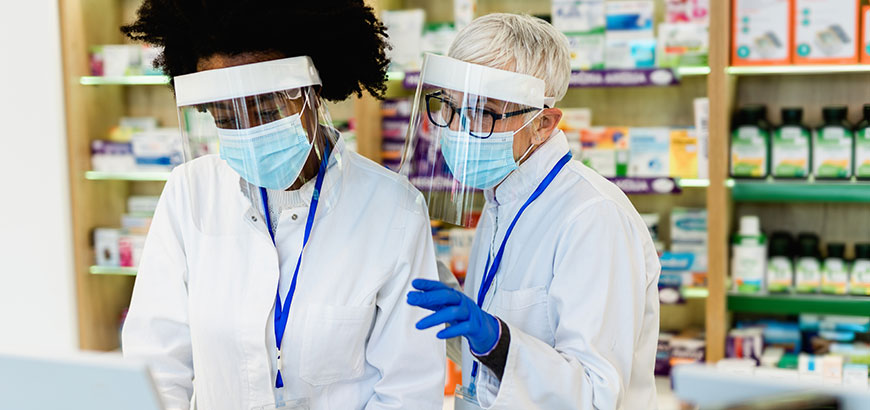By: McKesson Health Systems Editorial Team
Read time: 3 minutes
Cindy Jeter, senior manager, Macro Helix Implementation, joined fellow members of the ASHP Pharmacy Technician Forum’s executive committee for a discussion on “Practice Innovations and Advanced Roles of Pharmacy Technicians.” As a Certified Pharmacy Technician and a Certified Purchasing Professional, Cindy’s insight provided listeners with a peek into the role pharmacy technicians have served throughout the pandemic. At the center of the conversation was adaptability and optimism for what’s next. Read what Cindy shared.
Stepping Up
When the pandemic began, pharmacy technicians’ roles expanded significantly along with other members of the pharmacy team. Cindy says it provided an opportunity for them to showcase their capabilities. Pharmacy technicians were trained and prepared for the challenges that followed.
“Policies and procedures were changing almost hourly in some instances. Health systems added an essential new role of technician operation coordinator. These individuals had to be able to implement those new processes quickly—from converting units to COVID-19 patient care areas to changing medication in unit-based cabinets, reconfiguring drawers—whatever was needed to meet the needs of patients in critical care.”
Cindy explains pharmacy technicians’ enhanced knowledge about the flow of operations was invaluable.
Emergence of New Roles
Technician operations coordinator wasn’t the only position that emerged for pharmacy technicians. Other roles also arose to support the growing needs of patients. Cindy says these unique positions continue to be critical to hospital operations.
Another role, pharmacy communication coordinator also emerged, aimed at arming staff and other departments with pertinent communications.
“They had to quickly design a system to transfer key updates and notifications in real time. These coordinators help keep staff knowledgeable 24 hours a day and through various shifts. Additionally, they report to incident command centers, other hospitals throughout health systems, and hospital leadership, keeping all medical personnel informed,” says Cindy.
Additionally, a drug shortage management coordinator role developed during the pandemic, centralizing the task of obtaining critically needed medications for the entire health system. This position allowed for up-to-date communications throughout the system on critical medications, manufacturer policies and inventory available for a more streamlined and efficient process.
“With this position, you no longer have individual pharmacy buyers at 10 hospitals making calls to wholesalers and vendors. Drug shortage management coordinators are able to make the call on behalf of the health system. People in this role keep track of stock in hospitals, the number of critical care patients and can transfer items throughout the health system quickly.”
These additions among others are changes Cindy hopes to see remain in place post-pandemic.
A Bright Future
In addition to the evolving roles of pharmacy technicians, Cindy is excited about the expansion opportunities occurring in the pharmacy technician profession. Pharmacy technicians are vital health care professionals that worked tirelessly on the frontline during the pandemic. She says additional education and certifications continue to develop, authorizing technicians to specialize and advance their careers.
“There are more opportunities than ever before for technicians to find their perfect niche in most states including compounding, business management in informatics and analytics, training, working directly with patients taking medication histories, patient assistance programs and community outreach and administering vaccines.”
“So many of us got into healthcare because we wanted to help people. I see the sky opening up with more and more opportunities to do just that,” says Cindy.
To hear the full forum discussion, listen here.
Learn more about how McKesson partners with hospitals and health systems.

Share
Post
Post
Email